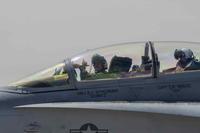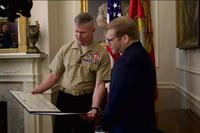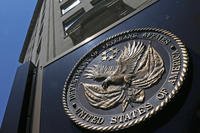
As of last October, the United States has had an up-to-date, formally articulated maritime strategy for the first time since the Reagan years. I believe you owe it to yourself to read A Cooperative Strategy for 21st Century Seapower which at only 20 pages, including many great color pics, is refreshingly lively and concise.
Instead of a war-plan to defeat the Eurasian mono-threat of the USSR, our nautical services are now charged with sharing the workload and costs, with their counterparts in other nations, in order to prevent -- or at least mitigate -- human suffering, strife, terror, and war anywhere on the planet within range of the sea.
I was in the audience at the Naval War College, Newport, RI, in June, 2006 when then-CNO Admiral Mike Mullen first called for developing this New Maritime Strategy via a Conversation with America. The idea was to solicit lots of suggestions (and, yes, criticisms) from civilian folks all across the country who had some knowledge of or interest in naval matters, ocean-borne commerce, and maritime security. (This ought to be all of us, since 90% of the worlds trade goods travel by sea.) Mullen soon put Vice Admiral John Morgan, Deputy CNO for Information, Plans and Strategy in charge of this ambitious undertaking.
The Conversation with America was dismissed by some pundits, almost from the outset, as just politically-driven grandstanding or a public relations ploy by the Navy. Having attended some half dozen conferences as the process rolled along, throwing my own two cents in more than once, I beg to differ. The latest event in this Great Seapower Dialogue was a talk and dinner with about 50 people last night at NYCs Cornell Club, where VADM Morgan spoke for ten minutes and then fielded Q&A for an hour. Yours truly was there, and was favorably impressed. The discussion was lively, at times even passionate. Morgan - an effective public speaker - answered every difficult question head on, with no evasion or double-talk, while absorbing valuable suggestions and acknowledging some serious admonishments.
Dont get me wrong. The New Maritime Strategy is by no means perfect. For one good discussion of its evident flaws and drawbacks, see Chris Cavass U.S. Roles Out New Maritime Strategy in the October 17, 2007 Defense News. One thing that frankly puzzled me from the start was that the strategy was being developed only after an official 30-year Shipbuilding Plan was laid out and then set virtually in stone - shouldnt you know your strategy before you decide what your Navy needs to look like? (Apparently, the pressing need to control and stabilize costs is what made the cart come before the horse here.)
But I want to talk about the conversation process itself, not the end-result document. My impression is that the Navy certainly did listen. Please allow me a personal annecdote to illustrate.
The kickoff conference for the Conversation occurred at the Naval War College in November of 06. The Spruance Auditorium was packed with an overflow crowd, about 1,200 people. Perhaps unfortunately, this was just after the Election Day where Democrats made a bit of a comeback in Congress. There was an odd tone of euphoric peace in our time among the outside academics and consultants whom the NWC had invited to be on the program. It came across as an article of faith that America would never again, ever, need to fight a major war. Global love was in the air and everywhere. I kid you not. By lunchtime I was rather disturbed. I ate with a couple of retired submariners who agreed, so it wasnt just me. The first panel after lunch, refreshingly enough, used the word threat more than once, and seemed to suggest that some other countries might actually be or might become our enemies.
During the Q&A of this panel, I stood and asked a question, because I was honestly confused. Since all missions of the U.S. Navy, such as strategic deterrence, and humanitarian aid, and even counter-terror containment, can be achieved if and only if the Navy has strong assets and skillsets for the core competency of major warfighting, why is major warfighting getting what seems to be such short shrift today? The meeting is almost over, and I think this panel was the first time Ive heard mentioned the possible future existence of big nation-state combat threats. The speakers backed off, explaining they hadnt meant to say that serious threats or major wars were in the cards. Oh my.
After this kickoff, the Conversation with America held its planned series of interactive meetings in major cities. I went to one of the last of these, in March 07, at the New York Athletic Club, in NYC. The Conversation had course corrected drastically. Major Warfighting was right up there, front and center, as a critical part of the budding New Maritime Strategys formative precepts. The final document, on page 10, states:
While war with another great power strikes many as improbable, the near-certainty of its ruinous effects demands that it be actively deterred using all elements of national power.
What might at first sound like mere wishy-washy compromise language is actually something of a breakthrough in developmental methodology and public presentation, namely the practical use of risk analysis concepts in formulating maritime strategy - a topic which, admittedly, is near and dear to my heart as a former actuarial management consultant, and which was mentioned by one panelist in November 06 and again in March 07. Instead of the Navy, now under new CNO Admiral Gary Roughead, trying to eke out a concensus best-estimate scenario and then optimizing everything to that one scenario as if it were certain, six months of intense open conversations (as well as heavy staff work and input from flag officers and the wider military) led to a clear recognition that the exact scenario of what the future will look like is impossible to know until its too late, and a big war is one not-entirely-implausible scenario. We do indeed really need to look across a broad spectrum of possible scenarios, and pay careful attention to those which, though the majority see them as unlikely, would have catastrophic effects on humanity if they occurred because we were caught unprepared.
The Conversation with America is by no means over. VADM Morgan announced that a whole additional wave of meetings is now underway. Why? A major issue raised by participants during the first go-round, and outspokenly reinforced by yesterday evenings guests, is that most of the attendees had come already convinced that we need a strong Navy, so that Mullen, Roughead, Morgan, et. al. were listening to their own choir. The new set of interactive get-togethers during 2008, not part of the original plan, will reach out to much wider crowds, some of whom will undoubtedly be challenging to converse with. These include a number of university faculty and student bodies, trade associations, civic entities, and groups with diverse minority demographics.
As VADM Morgan said at the Cornell Club, The Conversation with America is meant to engage people, not convince them. The Navy is listening.
-- Joe Buff








